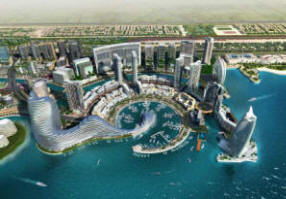
The first cruise company to use
Abu Dhabi as a home port is
pulling out less than a year after it started sailing from the capital as the
industry struggles in the wake of the Costa Concordia disaster.
Italy's MSC Cruises has scrapped plans to return to the emirate this year for
the next season in a setback for the emirate's ambitions to become a cruise
industry hub.
A variety of factors were behind its decision to withdraw, including commercial
reasons, the limited facilities and range of cruise destinations in the region,
and a preference to take the ship that was destined for Abu Dhabi to South
Africa instead, the company said.
"There is no doubt that MSC Cruises' guests enjoyed the destination," MSC
Cruises said. "However, for the long-term success of cruising in the [GCC]
region, new ports of call need to be developed, terminal facilities must be
upgraded and there must be increased focus on sourcing from local and regional
markets."
Abu Dhabi has identified the cruise sector as an important pillar in its tourism
ambitions as it aims to attract 2.3 million hotel guests by the end of this
year.
In the longer term, it is hoping to attract 300 sailings a year and 600,000
passengers by 2030, including ships that sail out of Abu Dhabi and those that
stop off in the capital as a port of call.
The first cruise ship to use Abu Dhabi as its base, the
MSC Lirica,
was estimated to have brought in about 40,000 visitors, with a direct economic
impact of Dh80 million (US$21.7m) to the emirate, including money spent on
flights, accommodation, retail, transport, food and beverage, according to
projections from the emirate's tourism authority issued at the time of its
launch.
The cruises sailed to Muscat, Fujairah, Khasab in Oman, and Dubai.
MSC Cruises had intended to bring a bigger ship to Abu Dhabi next season,
carrying 54,000 passengers.
But that ship, MSC Opera, is now going to
Durban in South Africa, where the company says it has made substantial
investments.
There have been a spate of safety incidents in the sector recently, including
the capsizing of the Costa Concordia off the coast of Italy, resulting in the
loss of 30 lives.
"[We view] MSC Cruises' decision as a short-term tactical imperative, largely
brought about by the commercial and operational challenges currently confronting
the global cruise industry," the Abu Dhabi Tourism and Culture Authority said.
"Abu Dhabi's cruise tourism hub ambitions continue unabated. Growth prospects,
for both fly-cruise and intra-regional cruises, remain fundamentally positive.
We are confident that there will be at least one major cruise liner home-porting
in Abu Dhabi in the 2013/14 season."
The tourism authority is striving to boost the industry.
"To realize our cruise hub ambitions, the authority has established a number of
strategic priorities," it said. "These include: the establishment of a dedicated
cruise terminal at
Mina Zayed within three years; the development of one of Abu Dhabi's many
islands into a permanent cruise port-of-call; the enhancement of passenger and
ship handling capabilities among Abu Dhabi stakeholders."
It also wants greater cooperation within the region to help to boost interest in
taking cruises among the local and regional populations, including India, with
the aim of growing "these bookings from their current level of 1 per cent of
total passenger figures to at least 10 per cent within three years".
The authority also remains in contact with MSC Cruises "with a view to
facilitating its return to Abu Dhabi in the near future", it said.
MSC Cruises also remains optimistic on the potential for the industry in the
region.
"The United Arab Emirates has great
potential in terms of travel and tourism, particularly as a destination for
cruise calls," the operator said.
"The growth of the cruise industry seen in recent years combined with the
region's commitment to encouraging future growth are significant evidence of
such potential." |
|
 |






